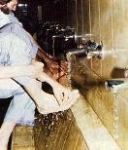26 July 2007
George Mason University: non-Muslim students asked to observe Muslim rules in common prayer area
The University of Michigan at Dearborn is planning to build foot baths for Muslim students who wash their feet before prayer. An elementary school in San Diego created an extra recess period for Muslim pupils to pray.
At George Mason University in Fairfax, Va., Muslim students using a "meditation space" laid out Muslim prayer rugs and separated men and women in accordance with their Islamic beliefs.
Critics see a double standard and an organized attempt to push public conformance with Islamic law.
"What (school officials) are doing … is to give Muslim students religious benefits that they do not give any other religion right now," says Richard Thompson, president and chief counsel at the Thomas More Law Center, an advocacy group for Christians.
Advocates say the accommodations are legal.
"The whole issue is to provide for a religious foundation for those who are observant while respecting separation of church and state," says Salam Al-Marayati, executive director of the Muslim Public Affairs Council, based in Los Angeles. Many schools accommodate the Christian and Jewish sabbaths and allow Jewish students to not take tests on religious holidays, he says.
Barry Lynn, of Americans United for the Separation of Church and State, says however that the law is murky on these expressions of faith. And the American Civil Liberties Union says overt religious symbols like crucifixes are not legal, but whether Muslim foot baths and prayer rugs fall into that category is not clear.
"That's a difficult one, and it's right on the edge," says Jeremy Gunn, director of the ACLU program on freedom of religion and belief in Washington, D.C.
At the forefront of the movement is the Muslim Students' Association, which has formed a Muslim Accommodations Task Force to push for foot baths and prayer rooms. At least 17 universities have foot baths built or under construction, including Boston University, George Washington University and Temple University, and at least nine universities have prayer rooms for "Muslim students only," including Stanford, Emory and the University of Virginia, according to the MSA's website. The association did not return calls seeking comment.
Zuhdi Jasser, a Muslim and chairman of the American Islamic Forum for Democracy, which promotes separation of mosque and state, says he is concerned about the accommodations. "Unusual accommodations for one faith at the cost of everybody else doesn't fall on the side of pluralism," he said.
At George Mason University, non-Muslim students were asked to observe Muslim rules in the prayer area, such as keeping men on one side and women on the other and removing their shoes, according to Broadside, the school newspaper. Alissa Karton, assistant to the vice president for student life, said the article prompted the school to order students to roll up prayer rugs when not in use and move the dividers.
The University of Michigan agreed to install foot baths after talks with the MSA, said Terry Gallagher, director of public relations at the campus. Some Muslims ritually wash their feet before praying five times a day.
Daniel Pipes, founder of the Middle East Forum, a conservative think tank, sees the requests as part of a movement to force the public to acquiesce to Islamic law.
"The goal of Islamists is the application of Islamic law," Pipes says.
In the San Diego case, a substitute teacher at Carver Elementary School alleged that teachers were indoctrinating students into Islam. The San Diego Unified School District determined that a teacher's aide was wrong to lead Muslim students in prayer. Carver still has a special recess to allow 100 Muslim students to pray.
The ACLU, which has often sued schools for permitting prayer, says it is waiting to see what kind of policy the school settles on before deciding whether to sue. It says promoting prayers is unconstitutional.
"If you start carving out time in the school day that you would not do but for the need to let students pray, then it begins to look like what you're trying to do is to assist religion," says David Blair-Loy, legal director for the ACLU in San Diego.
Thompson says such conflicts are bound to proliferate. He and other Christians, he says, are preparing to ask for equal consideration such as a Christian prayer recess.
"What you're going to see out there is more of these kinds of cases as the Muslim community tests how far it can go in the public school system," he says. "If this can happen for Muslims, it can happen for Christians and other religions."
23:05 Posted in UNITED STATES | Permalink | Comments (0) | ![]() Facebook |
Facebook |




















The comments are closed.